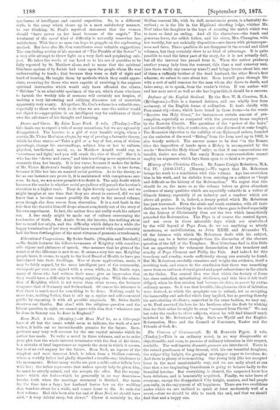History of the Christian Church. By James Craigie Robertson, Vol.
IV. (1303-1517.) (Murray.)—We regret that Mr. Robertson brings his work to a conclusion with this volume. Age has overtaken him in his work, and he shrinks from entering on a subject so "large and difficult as the history of the Reformation." We regret that this should be so, the more so as the volume before us gives abundant evidence of many qualities which are especially valuable in a writer of Church history, especially of an industry and a candour which are above all praise. It is, indeed, a dreary period which Mr. Robertson has just traversed. Even the ninth and tenth centuries, with all their darkness, are less shocking to the student whose gaze is fixed especially on the history of Christianity than are the two which immediately preceded the Reformation. The Pope is of course the central figure, and not even in those miserable days which are symbolised by the wild legend of Pope Joan, do we see anything so utterly monstrous, so anti-Christian, as John XXIII. and Alexander VI. Of the fairness with which Mr. Robertson deals with his subject, nothing can be a better example than his discussion of the obscure question of the fall of the Templars. Most historians find in this little but an opportunity for vehement denunciation of the treachery and cruelty of Pope Clement and Philip the Fair. And indeed for this treachery and cruelty, words sufficiently strong can scarcely be found.. But Mr. Robertson carefully examines and weighs the evidence, itself a revolting task, and conies to the conclusion that there was something more than an outburst of royal greed and papal subservience in the attack on the Order. The central idea was that which the Society of Jesus has since embodied, unhesitating obedience, and this idea it felt itself obliged, when its first mission had become obsolete, to assert by extra- ordinary means. So it was that horrible, blasphemous rites of initiation were devised, to which the neophyte was to submit, not as accepting the immorality and unbelief which they implied, but as proving thereby his unhesitating obedience, somewhat in the same fashion, we may say, as St. Paul asserted his love for his brethren after the flesh by wishing that for their sakes he might be even "accursed from Christ." We can but refer the reader to other subjects, where he will find himself much indebted to Mr. Robertson's help. Such are Wyclif and the English Reformation, Huss and the Council of Constance, Tattler and the Friends of God, dm






























 Previous page
Previous page